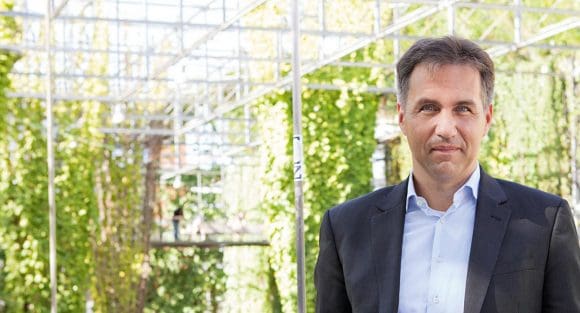
Mr. Vellacott, should we enjoy ourselves more?
Definitely!
At the nearest park with friends...
... or in the garden of your home. There are so many interesting things to see. Three types of dragonfly turned up in our pond in Zurich Altstetten – and a nuthatch paid us a visit. I don’t have to go to the Serengeti to experience the variety and beauty of nature.
And what can we do to protect nature?
There are areas where we can make a particularly strong impact.
Which are?
At home: how should I heat and cool it; what type of electricity should I use? Can I reduce my consumption? Transportation: how do I get from A to B? It’s all well and good to cycle to work, but how often do I fly? Eating: there’s no need for everyone to go vegetarian, but would meat once or twice a week be enough? Investment: how is my money invested, including my retirement savings? Am I financing coal-fired power stations, or renewable energy? Politics: am I giving my vote to people who protect the environment? I also find it impressive when people are active in their local area.
Like modern cooperatives?
It could be a neighborhood association, a group that forms spontaneously, or a cooperative. The culture of sharing is becoming established here. We don’t all need our own lawnmower, dinghy, or grain mill. Some things I only want to use; there’s no need to own them.
Even companies like Audi are encouraging people to share.
Switzerland has some very good sharing schemes, like Mobility, sharoo and Catch a Car. In the past, a car was a status symbol. Nowadays, young people no longer want to own one.
People want to own less but fly everywhere...
The ecological footprint of flying is certainly a big problem. Do we really want to continue subsidizing the aviation industry’s rising CO2 emissions with tax breaks? The question arises as to whether flying more makes us happier?
The busier the airports, the more unattractive flying becomes.
We often feel we have to balance what’s “good for the environment” with what’s “enjoyable for us”. Yet what benefits the environment often benefits us, too. That also goes for business trips. Flying to London for a meeting in a packed plane is no fun. Video conferences seem much more efficient and convenient to me.
What score would you give UBS in terms of its environmental commitment?
We recently published ratings on the sustainability of Swiss retail banks. UBS generally has a positive score for its management and lending business. When it comes to investing, it should use sustainable criteria more systematically.
How is Switzerland doing in terms of green technology?
There were early pioneering phases, such as the switch from coal to electricity in the rail sector after the First World War, and the development of solar cells in the 1970s and ’80s. In the 1990s, Swiss financial services providers were world leaders when it came to sustainable investments. Meanwhile, ecological innovations have often been brought to market elsewhere. A more pioneering spirit would do us good today.
What makes you optimistic?
I see a shift toward sustainability that is unprecedented in terms of its depth and speed. Never before have such large parts of the population campaigned so powerfully for our planet. I am convinced that protecting the environment ultimately benefits us all.
Managing nature
Thomas Vellacott (46) is CEO Switzerland of the environmental organization World Wide Fund for Nature (WWF) and manages 200 employees from Zurich. He also teams up with big corporations for this good cause. Unlike some environmental activists, Vellacott has never occupied a power plant. He has studied Arabic, worked in client acquisition for a bank, and made a career as a consultant at McKinsey.
Useful tips
Also of interest to you
Also of interest to you
